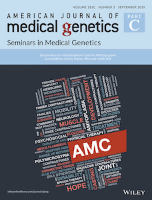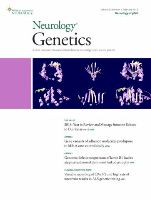
AMERICAN JOURNAL OF MEDICAL GENETICS PART C-SEMINARS IN MEDICAL GENETICS
Scope & Guideline
Empowering Knowledge in Genetic Science and Health.
Introduction
Aims and Scopes
- Clinical Genetics and Genetic Counseling:
The journal emphasizes the importance of clinical genetics, including genetic counseling practices, to ensure that patients receive accurate information and support regarding genetic conditions. - Genetic Disorders and Syndromes:
A significant focus is placed on various genetic disorders, their phenotypic manifestations, and the implications for diagnosis and management, particularly in rare and complex syndromes. - Patient-Centered Perspectives:
The journal values narratives and experiences from patients and families, highlighting the impact of genetic conditions on their lives and the healthcare system. - Innovative Genetic Technologies:
Research on emerging technologies in genetics, such as gene-targeted therapies, whole-genome sequencing, and artificial intelligence applications in clinical settings, is a core area of interest. - Public Health and Newborn Screening:
The journal addresses public health issues related to genetic screening, particularly newborn screening programs, and their role in early diagnosis and intervention for genetic disorders.
Trending and Emerging
- Patient Narratives and Experiences:
Increasing emphasis on patient narratives underscores the importance of understanding the lived experiences of individuals with genetic conditions, informing better care practices and policies. - Integration of Artificial Intelligence in Genetics:
A surge in research exploring the role of artificial intelligence and machine learning in genetics demonstrates a trend towards leveraging technology to enhance diagnostic accuracy and patient care. - Comprehensive Management of Down Syndrome:
There is a growing focus on comprehensive healthcare strategies for individuals with Down syndrome, addressing their specific needs across the lifespan and promoting better health outcomes. - Genetic Counseling Innovations:
Emerging themes in genetic counseling practices highlight the need for innovative approaches to improve patient communication and support, particularly in the context of complex genetic information. - Health Disparities and Access to Genetic Services:
Recent publications reflect a heightened awareness of health disparities in access to genetic services, emphasizing the importance of equitable healthcare solutions for diverse populations.
Declining or Waning
- Traditional Genetic Testing Methods:
There seems to be a waning interest in traditional genetic testing methods as newer technologies like whole-genome sequencing and direct-to-consumer genetic testing gain traction, reflecting a shift towards more advanced diagnostic tools. - Focus on Common Genetic Disorders:
The journal's publications suggest a decreasing focus on common genetic disorders, such as well-known hereditary conditions, as more attention is directed toward rare genetic syndromes and complex cases. - Historical Perspectives on Genetic Disorders:
There is a noticeable decrease in articles exploring historical perspectives and cultural representations of genetic disorders, as the journal shifts towards contemporary clinical applications and patient experiences.
Similar Journals

npj Genomic Medicine
Shaping the Future of Healthcare with Genomic Insightsnpj Genomic Medicine is a leading open-access journal published by NATURE PORTFOLIO, specializing in the rapidly evolving areas of genomic medicine, including genetics, molecular biology, and clinical applications. Launched in 2016, the journal has quickly established itself within the academic community, boasting a prestigious Q1 ranking in multiple categories, including Genetics and Molecular Biology, with remarkable positions in both Scopus ranks and percentiles. With an emphasis on innovative genomic research that bridges the gap between laboratory findings and clinical implementation, npj Genomic Medicine aims to provide a platform for researchers, professionals, and students to share significant advancements and insights. Being an open-access journal enhances accessibility to cutting-edge research, ensuring that vital discoveries in genomics can benefit a global audience and facilitate interdisciplinary collaboration. The journal continues to contribute to the forefront of genomic research, impacting both academic scholarship and practical healthcare solutions.

PLoS Genetics
Exploring the frontiers of genetics with unparalleled accessibility.PLoS Genetics, published by the PUBLIC LIBRARY SCIENCE, is a leading open-access journal dedicated to advancing the field of genetics, molecular biology, and related disciplines. With its ISSN of 1553-7404, this esteemed journal has been offering unrestricted access to its content since 2005, fostering a global community of researchers, professionals, and students. Situated in the United States, its contributions can be found at 1160 Battery Street, Ste 100, San Francisco, CA 94111. As of 2023, PLoS Genetics proudly holds a Q1 ranking in multiple categories including Cancer Research, Ecology, Evolution, Behavior and Systematics, Genetics, and Molecular Biology, underscoring its impact in these vital scientific areas. The journal's commitment to disseminating high-quality research is reflected in its impressive Scopus rankings, with notable positions in various fields of study, ensuring that it remains a crucial resource for cutting-edge research and innovation. By providing an open-access platform, PLoS Genetics not only enhances the visibility of genetic research but also encourages collaborations and the sharing of knowledge that can lead to significant breakthroughs in science.

Neurology-Genetics
Transforming Understanding of Neurological and Genetic Disorders.Neurology-Genetics, an esteemed journal published by LIPPINCOTT WILLIAMS & WILKINS, is at the forefront of advancing the fields of neurology and genetics. With a dedicated Open Access model since 2015, this journal ensures that cutting-edge research is readily available to researchers, professionals, and students worldwide. Operating from the United States, Neurology-Genetics has established a reputable position within the scientific community, as reflected by its impressive rankings in Scopus; it holds a Q1 ranking in clinical neurology and a Q2 ranking in clinical genetics, showcasing its dual commitment to these intertwined fields. With an impact factor that continues to grow alongside its reach, the journal encourages the dissemination of novel findings, innovative methodologies, and critical reviews that contribute to the understanding and treatment of neurological and genetic disorders. Researchers and practitioners are invited to engage with the latest discoveries and discussions, making Neurology-Genetics an essential resource for anyone involved in these dynamic areas of study.

INTERNATIONAL JOURNAL OF HUMAN GENETICS
Unveiling Insights in Molecular BiologyINTERNATIONAL JOURNAL OF HUMAN GENETICS is a distinguished publication dedicated to advancing knowledge in the fields of genetics and molecular biology. Published by KAMLA-RAJ ENTERPRISES, this journal explores critical developments and research findings from 2008 to 2016, though its coverage in Scopus has since been discontinued. With an ISSN of 0972-3757 and an E-ISSN of 2456-6330, the journal aimed to foster scholarly dialogue and serve as a resource for researchers, professionals, and students engaged in human genetics. While the journal holds a modest ranking in categories such as Biochemistry and Genetics, it remains a vital source for exploring niche topics within the realm of human genetics. Researchers interested in genetic screening, gene therapy, and clinical genetics will find valuable insights herein. Despite its pause in indexing, the journal continues to contribute to the academic discourse by disseminating critical research that bridges gaps in understanding human genetics.

European Journal of Medical Genetics
Advancing Genetic Insights for Enhanced HealthcareEuropean Journal of Medical Genetics, published by Elsevier, is a pivotal platform dedicated to advancing knowledge in the fields of medical genetics and its clinical applications. With an ISSN of 1769-7212 and an E-ISSN of 1878-0849, this journal fosters innovative research and insights into the genetic factors that influence human health. Ranked in the Q3 category for both Genetics and Clinical Genetics, and achieving notable recognition in Medicine (miscellaneous) with a Q2 positioning, it strives to bridge the gap between laboratory findings and clinical practice. Operating in an Open Access format, the journal aims at maximally disseminating essential findings to researchers, professionals, and students alike, ensuring that critical advances in genetics are accessible to the global medical community. With converged publication years spanning from 2005 to 2024, the journal strengthens its mission to be at the forefront of genetic research that informs clinical methodologies and fosters improved healthcare outcomes.

Molecular Syndromology
Enhancing Knowledge in Genetic MedicineMolecular Syndromology is a premier journal focused on the intricate connections between molecular genetics and syndromology, fostering discussions that advance our understanding of genetic disorders and their clinical implications. Published by KARGER, a distinguished name in medical and scientific publishing, this journal serves as a valuable platform for researchers, clinicians, and students in the field of genetics. With its ISSN 1661-8769 and E-ISSN 1661-8777, the journal has gained recognition in its category, currently positioned in the Q4 quartile for both genetic and clinical genetics disciplines according to the latest metrics. Despite being indexed lower in Scopus rankings, it addresses crucial gaps in research and offers open access options that enhance visibility and dissemination of knowledge. As it continues to converge from 2010 to 2024, Molecular Syndromology aims to bridge the gap between molecular research and its clinical applications, making a significant impact in the evolving landscape of genetic medicine.

EUROPEAN JOURNAL OF HUMAN GENETICS
Unraveling the Mysteries of Our Genetic CodeThe EUROPEAN JOURNAL OF HUMAN GENETICS, published by SpringerNature, stands as a preeminent platform in the field of genetics and clinical genetics. Established in 1993, this prestigious journal, with an ISSN of 1018-4813 and an E-ISSN of 1476-5438, has consistently maintained its position in the Q1 quartile for both Genetics and Clinical Genetics categories as of 2023, reflecting its significant contributions to the field. Its impact is further underscored by its impressive Scopus rankings, placing it in the 92nd percentile among clinical genetics journals. The journal aims to disseminate cutting-edge research, case studies, and reviews that advance our understanding of human genetics, promoting collaboration and innovation among researchers, professionals, and students alike. While it does not currently offer open access, the journal provides substantial value through its rigorous peer review process and commitment to quality. As it continues to shape the future of genetic research through 2024 and beyond, the EUROPEAN JOURNAL OF HUMAN GENETICS remains an essential resource for those dedicated to exploring the complexities of human heredity.

CLINICAL GENETICS
Exploring the complexities of genetic disorders.CLINICAL GENETICS is a premier journal in the field of genetics, published by Wiley, and is renowned for advancing the understanding of genetic disorders and their clinical applications. With a notable impact factor and ranking in the top quartile (Q1) in both general genetics and clinical genetics as of 2023, this journal is instrumental for researchers, professionals, and students seeking to explore groundbreaking studies and developments in genetics. Since its inception in 1970, CLINICAL GENETICS has continued to publish high-quality, rigorously peer-reviewed research that pushes the boundaries of knowledge in clinical genetics. The journal maintains a strong reputation in its field, currently holding significant positions in Scopus rankings, including 30th out of 99 in clinical genetics, underscoring its relevance and impact in the field. For those interested, the journal's website provides comprehensive access options for current and archived research, making it an essential resource for anyone involved in genetic research and its clinical application.

ANNALS OF HUMAN GENETICS
Illuminating the Path to Genetic UnderstandingANNALS OF HUMAN GENETICS is a distinguished peer-reviewed journal extensively covering the field of genetics, published by Wiley. Established in 1954 and extending its influence into 2024, this journal features comprehensive research articles, reviews, and case studies aimed at advancing our understanding of human genetic conditions and their implications on health. With its ISSN number 0003-4800 and E-ISSN 1469-1809, the journal has carved a prominent niche within the academic community, currently ranking in the third quartile in both genetic and clinical genetics categories (Q3, 2023). Its Scopus rankings reflect its credibility, placing it #54 out of 99 in clinical genetics. Though it is not open access, it remains an essential resource for researchers and practitioners seeking to explore the latest findings and methodologies in genetics, serving as a critical platform for knowledge dissemination and dialogue within the scientific community. As we delve deeper into the complexities of our genetic makeup, the ANNALS OF HUMAN GENETICS continues to play a vital role in fostering innovation and collaboration in this ever-evolving field.

Genetics Research
Pioneering Insights in the World of GeneticsGenetics Research, published by HINDAWI LTD, is a distinguished open access journal that has been at the forefront of genetic studies since its inception in 1960. With the transition to open access in 2019, this journal has expanded its accessibility, fostering knowledge dissemination across the global scientific community. Operating out of the United Kingdom, it provides a platform for innovative research in the fields of genetics and molecular biology, encompassing a broad range of topics that are highly relevant to medical sciences. As of 2023, it holds a Q4 classification in Genetics and a Q3 classification in miscellaneous Medicine, reflecting its ongoing commitment to scholarly excellence amidst shifting academic landscapes. While the journal's H-index remains unlisted, its indexed ranking within Scopus, with a rank of #325/328 in the Genetics category highlights the challenges ligated to its niche audience. Nevertheless, it serves as a crucial resource for researchers, professionals, and students eager to contribute to and stay informed on the latest genetic research trends and breakthroughs.